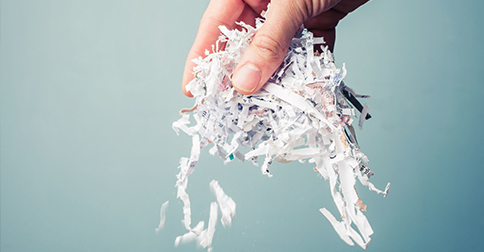
Documents to Keep, Documents to Shred

We all know it’s important to stay on top of our bills and paperwork so that nothing gets lost or forgotten. We pay our bills on time, we file our taxes by the deadline, and we save money dutifully. But even the most organized among us can get overwhelmed by the amount of paperwork that comes in the mail every day.
Good news — most of it isn’t something you need to keep. Read on to find out what you can toss and what you can’t!
What to Keep
Tax forms are the main type of document you need to hang on to. If you’re ever audited, you’ll need all your forms from that tax year to prove to the IRS that your return was done correctly. Include your estate planning documents and your pension plan documents in this category, too.
(Feeling overwhelmed at the mention of estate planning? Remember that estate planning in Alabama, along with all its paperwork, can and should be done by a professional who can walk you through the process.)
According to the IRS, you should keep all your tax documents for at least three years. These documents include your W-2s (income for the year) and your Form 1098 (mortgage interest statement).
If you have claimed a loss from bad debt deduction or worthless securities, that time period actually increases — you should keep those tax documents for seven years. After that, the only reason you’d need to keep hanging on to them is if you either haven’t filed a return at all, or if you filed a fraudulent return (and if you’ve done that, you’ve got bigger fish to fry than document shredding questions).
What to Shred
Typically, bank account statements and bill balances can be shredded and tossed. The purpose of these documents is to update you on balances in that moment, but they don’t need to stick around any longer than you want them to.
In fact, most statements of this kind are easily found online, which can be more convenient — not to mention less clutter-inducing — than receiving a paper statement in the mail.
If you’re overwhelmed by the paperwork you receive on a daily, weekly, or monthly basis, consider switching to electronic statements for things like your checking account, savings account, and credit card statements.
Estate Planning in Alabama: Call Bradford & Holliman
Aside from helping you determine which documents you need and which ones you don’t, Bradford & Holliman is here to walk you through the entire estate planning process. Don’t let confusion or uncertainty stop you from planning for the future. Contact us today!

